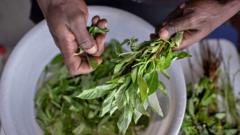A controversial alcohol control plan introduced by Kenya's authorities aims to raise the minimum drinking age and restrict sales, leading to significant public criticism and concerns about its economic impact.
Kenya's Proposed Alcohol Regulation Stirs Controversy and Fear of Economic Fallout

Kenya's Proposed Alcohol Regulation Stirs Controversy and Fear of Economic Fallout
New measures aimed at curbing alcohol consumption, including age restrictions and sales bans, are facing fierce backlash from the public and industry players.
Kenya is currently engulfed in a heated debate following the announcement of ambitious plans aimed at drastically controlling alcohol sales and consumption in the country. The proposed legislation seeks to raise the legal drinking age from 18 to 21 years, ban alcohol purchases in supermarkets and restaurants, and prohibit home delivery and online sales. Additionally, it would restrict celebrity endorsements of alcoholic beverages.
The National Authority for the Campaign Against Alcohol and Drug Abuse (Nacada), which unveiled these proposed measures, argues that they are essential for combating rising substance abuse, particularly among the youth demographic. However, many Kenyans, including stakeholders within the alcohol industry, have condemned these initiatives as harmful and economically detrimental. If adopted, these regulations would confine alcohol sales to licensed pubs and bars only.
Nacada's measures have been characterized as some of the most stringent anti-alcohol policies witnessed in Kenya to date. In a 2022 survey, the agency reported that 5% of Kenyans aged 15 to 65 were struggling with alcohol dependence. In the face of significant backlash, Nacada clarified that the draft policy is still in its preliminary stages and any proposals requiring legal enforcement will undergo a meticulous review process.
Industry representatives and traders have voiced their disapproval, labeling the proposed policy as exclusionary and unrealistic. The Alcoholic Beverage Association of Kenya (Abak) criticized Nacada for not including input from manufacturers, which they argue could have enriched the policy framework. “This approach puts livelihoods and many jobs at risk,” the association warned.
Legal expert Donald Kipkorir raised concerns on X, asserting that these sweeping bans could cripple the hospitality sector, which relies heavily on alcohol sales. He argued that good food and drink are integral to Kenya's tourism appeal.
This is not the first time Kenya has attempted to tackle alcohol abuse through legislation; previous efforts have met with varying degrees of success. A similar proposition made by former Deputy President Rigathi Gachagua in 2023 aimed to limit the number of pubs operating in certain regions and ultimately fell short amid pushback from bar and restaurant owners.
The ongoing discussion underscores the complexities surrounding alcohol regulation in Kenya and its far-reaching implications for public health and the economy.





















